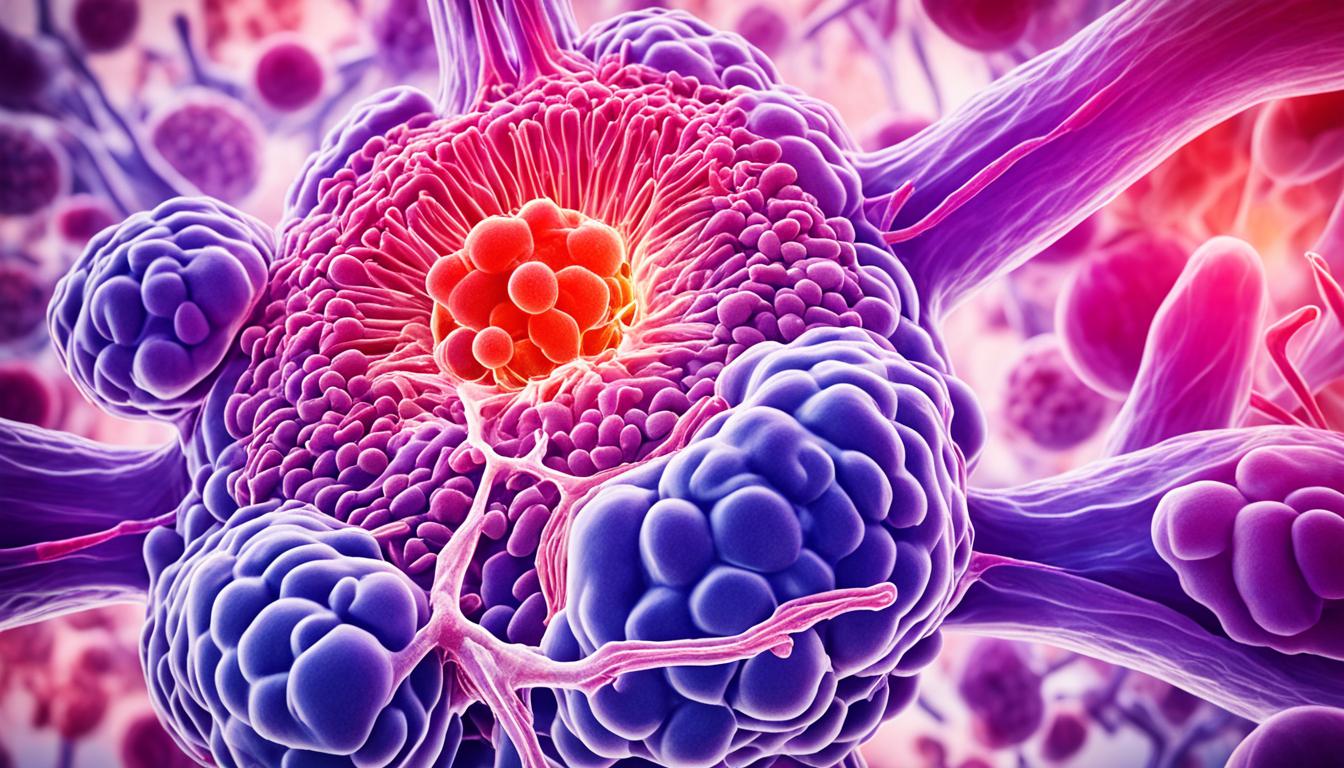Chronic lymphocytic thyroiditis is a common thyroid disease known as Hashimoto’s thyroiditis. It affects the thyroid gland and causes hypothyroidism. This disease happens when the immune system attacks the thyroid, making it hard for the gland to work right. This leads to low levels of thyroid hormones and many health problems.
This disease is more likely to affect women. It is about 10 times more common in females than in males. Genetics also seems to have a big part in getting this disease. If someone in your family has thyroid or autoimmune issues, you might be more at risk. Women between 30 and 50 years old are especially at risk.
The signs of this disease can change from person to person. They might include gaining weight, feeling very tired, or having trouble with your periods. Hair loss and muscle pain are also common. These symptoms can make life hard and might need a doctor’s help to manage.
To find out if you have Chronic Lymphocytic Thyroiditis, doctors will look at your history and do a physical check. They will also use ultrasound to look at your thyroid. Blood tests help by checking your thyroid hormone levels. A correct diagnosis matters a lot for starting the right treatment.
The main way to treat Chronic Lymphocytic Thyroiditis is with medicines that replace the thyroid hormones. This can ease your symptoms and help your thyroid work better. But, scientists are looking into new ways to treat this disease. One of these ways is using stem cells to heal the thyroid.
Key Takeaways:
- Chronic lymphocytic thyroiditis is a top reason for low thyroid levels in developed nations.
- This autoimmune problem attacks the thyroid, leading to swelling and low thyroid function.
- Being a woman, aged 30-50, with family history of related issues, or personal autoimmunity raises your risk.
- Its symptoms can be weight gain, tiredness, mood changes, and losing hair.
- Diagnosis needs medical history, checkup, ultrasounds, and blood tests on thyroid hormones.
- Treatment usually includes hormone replacement, but stem cell therapies might offer a new path.
What is Hashimoto’s Thyroiditis and Its Causes?
Hashimoto’s thyroiditis is a condition. It is when the immune system attacks the thyroid. This attack causes inflammation and damage.
Because of the immune response, the thyroid can’t work properly. It leads to less production of thyroid hormones. This makes the person have hypothyroidism.
The exact reason for the immune system’s abnormal response is not clear. But, it seems genes and the environment are important. Having certain genes might make you more likely to get Hashimoto’s. Also, things like viral infections, stress, or exposure to chemicals may start the immune attack.
This condition might make the thyroid grow larger, known as a goiter. It gets bigger because of the inflammation and damage to the thyroid.
Symptoms and Diagnosis of Hashimoto’s Thyroiditis
Hashimoto’s thyroiditis slowly shows up, making it hard to spot right away. People with Hashimoto’s often gain weight, feel constipated, and very tired. They also get cold easily, feel down, and have muscle and joint pain. Other signs are thinning hair, heavy periods, and a hoarse voice.
Your doctor may notice a swollen thyroid during a check-up. This swelling is called a goiter. Other clues like dry skin, weak nails, and slow reflexes can point to a thyroid problem.
Diagnosing Hashimoto’s involves looking at your history, doing a physical exam, and blood tests. Your history tells the doctor about your symptoms and any potential risks. The exam helps check your thyroid’s size and any other signs.
The main blood test looks at thyroid-stimulating hormone (TSH) levels. TSH goes up in Hashimoto’s because the thyroid can’t make enough hormones.
Doctors also check for special antibodies that attack the thyroid. Finding these confirms Hashimoto’s.
Tests also look at your thyroid hormone levels (T3 and T4). In Hashimoto’s, these are often low.
Sometimes, an ultrasound checks the thyroid’s health. It can spot lumps or other issues.
Summary
Hashimoto’s has many symptoms that show up slowly. Doctors use a mix of history, exams, and tests to diagnose it. Early detection and treatment can help manage the disease well.
Stem Cell Therapy for Hashimoto’s Thyroiditis
Currently, treating Hashimoto’s thyroiditis involves HRT to manage thyroid hormone levels. Yet, HRT doesn’t fix the immune system’s root issue. Stem cell therapy, however, looks like a new way to treat this condition.
Mesenchymal stem cells (MSCs) show they can help the immune system and grow back damaged thyroid cells. Studies prove MSCs can lower swelling and keep thyroid cells working.
The process for stem cell therapy includes a health check, taking cells from fat or blood, growing these cells in a lab, then giving them to the patient through a vein. This treatment aims to fix immune system problems, lessen swelling, and help the thyroid regenerate.
But, more studies are needed to know how well stem cell therapy works for Hashimoto’s thyroiditis. Despite this, it seems like a new and possibly good way to fight this autoimmune condition.

